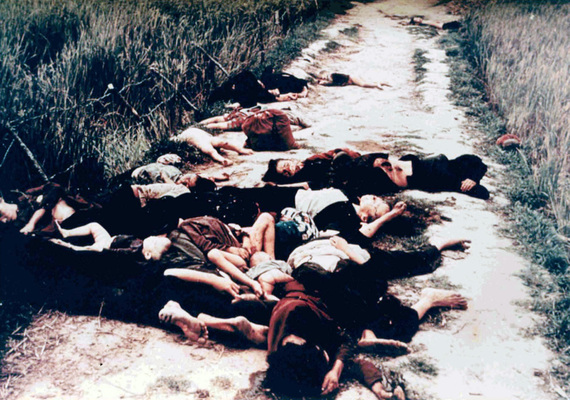Vietnam 1964
Fifty years ago, the American media aided the Johnson administration in leading the nation into war under false pretenses. Our media therefore bears some of the responsibility for a needless war which killed 58,000 Americans and over a million Vietnamese. (The photo below shows some of the victims of the infamous 1968 My Lai massacre, which resulted in Lt. William Calley's court martial and conviction.)
In 1964, the media unquestioningly repeated the Johnson administration's claim that on August 2, and again on August 4, American destroyers, innocently cruising in the Tonkin Gulf, suffered two unprovoked attacks by North Vietnamese PT boats. But on the day after the first attack, in a now declassified phone call, Pres. Johnson told a friend how we had provoked that attack:
There have been some covert operations in that area that we have been carrying on - blowing up some bridges and things of that kind, roads, and so forth. So I imagine they wanted to put a stop to it. So they come out there and fire and we respond immediately with five-inch guns from the destroyer and with planes overhead. And we cripple them up - knock one of them out and cripple the other two. And then we go right back where we were with that destroyer [the Maddox], and with another one [the Turner Joy], plus plenty of planes standing by.
The truth surrounding the second attack is even more stunning. As flatly stated in a formerly Top Secret NSA history, "no attack happened that night."
Rather than raising questions about the Johnson administration's lies and omissions, the media inflamed the nation's passion for war. All three major weekly news magazines of the day -- LIFE, TIME and Newsweek -- described the second non-attack as a dangerous battle, with Newsweek being typical:
At 9:30 p.m., the Maddox reported that enemy craft, identified as Soviet-built 50- and 100-ton PT boats, were closing in. By 9:52 p.m., both destroyers were under continuous torpedo attack. ... Torpedoes whipped by, some only 100 feet from the destroyers' beams. A PT boat burst into flames and sank. ... For more than three hours the battle continued in the turbulent seas. Another PT boat exploded, sank, and then the others scurried off into the darkness nursing their wounds.
The battle was won. Now it was time for American might to strike back.
The media's drumbeat to war did its job, and within days, the Tonkin Gulf Resolution passed the House 416 to 0 and the Senate 88 to 2, giving Pres. Johnson the blank check he needed to escalate the Vietnam War.
Repeating the Mistake: Afghanistan 1980s and Iraq 2003
Our role in creating al Qaeda in Afghanistan during the 1980s and our 2003 invasion of Iraq show that that we did not learn from Vietnam, and again jumped into wars without asking the right questions.
Pres. Reagan praised the Afghan mujahideen as freedom fighters, a perspective supported by the media. Today, we are fighting some of those same people, except now we call them Islamic terrorists.
And the two reasons given for invading Iraq turned out to be baseless. Saddam Hussein's WMDs were figments of our imagination, as were his connections to al Qaeda and 9/11. Ironically, al Qaeda-linked groups, which were virtually non-existent in Saddam Hussein's Iraq, now control large swaths of territory, including Iraq's second largest city.
In both Afghanistan and Iraq, the drumbeat to war hypnotized the nation, overcame rationality, and led to disasters. And, as with Vietnam, the media played a key role in creating those tragedies.
Ukraine Today
The mistake of becoming involved in a war without first making sure our assumptions are correct is being repeated today with the civil war in Ukraine. It's time to learn from the past and start questioning media accounts which picture Putin and Russia as solely at fault and the interim Ukrainian government as blameless. Wars bring out the worst elements on both sides, so common sense alone should lead us to question the overly simplified narrative the media are feeding us.
Putin and Russia have made many mistakes in Ukraine, but so have we. Ronald Reagan's Ambassador to Moscow, Jack Matlock, wrote in a February 8 post:
I believe it has been a very big strategic mistake - by Russia, by the EU and most of all by the U.S. - to convert Ukrainian political and economic reform into an East-West struggle. ... In both the short and long run only an approach that does not appear to threaten Russia is going to work. (emphasis added)
As with our wars in Vietnam, Afghanistan, and Iraq, most American media have ignored or downplayed information which does not fit the prevailing narrative about Ukraine. Such biased coverage prolongs the violence in the eastern part of the country and increases the risk that Putin will move in troops. If that occurs, it will increase the risk of nuclear threats and therefore, potentially, even of nuclear use.
Given how often we have been duped into needless wars by overly simplistic media accounts which painted one side as good and the other as bad, it's high time we started asking more questions before making that mistake again. In Vietnam, Afghanistan, and Iraq the cost of our error was measured in millions of lives. In Ukraine, where our potential adversary is Russia with its thousands of nuclear weapons, the potential consequences are beyond comprehension.
